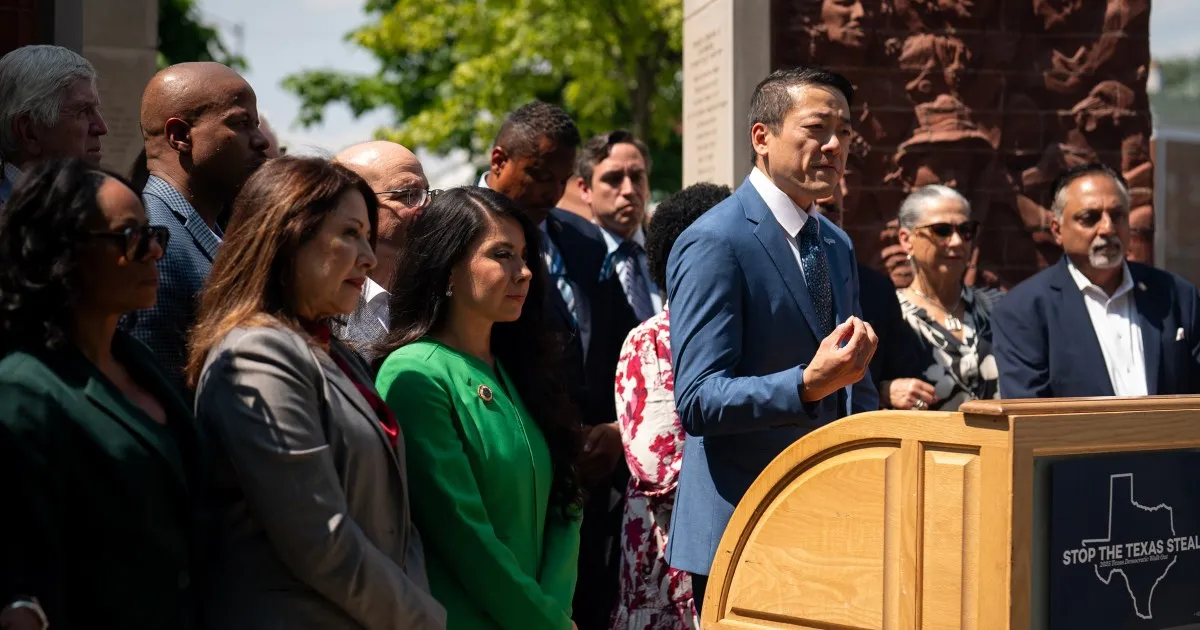
Texas Democratic lawmakers announced their return to the state on Monday after a two-week absence that had temporarily obstructed Republican leaders from implementing a controversial plan to enhance their majority in the U.S. House. This political standoff ignited significant national debate surrounding redistricting efforts, highlighting the ongoing tensions between the two parties.
The Democratic legislators decided to conclude their absence after successfully blocking the Texas Republicans from enacting a newly drawn congressional map during the initial special legislative session. Their return coincided with California Democrats unveiling their own redistricting proposal, which added pressure to the Texas GOP's plans. Following Texas Governor Greg Abbott's call for a second special session, the returning Democratic lawmakers now enable the GOP-controlled Legislature to advance their new congressional map.
“We killed the corrupt special session, withstood unprecedented surveillance and intimidation, and rallied Democrats nationwide to join this existential fight for fair representation — reshaping the entire 2026 landscape,” stated Gene Wu, Chair of the Texas House Democratic Caucus. “Our return allows us to build the legal record necessary to defeat this racist map in court, take our message to communities across the state and country, and inspire how to fight these undemocratic redistricting schemes in their own statehouses.”
While Texas Democrats lacked significant legislative power during their absence, they garnered widespread acclaim from fellow party members for their efforts in delaying the Republicans' mid-decade redistricting initiative. This two-week quorum break has proven costly for the Democratic lawmakers, as each day of absence incurs a fine of $500. Many lawmakers also faced security threats while away from their families, adding to the challenges of their protest.
In the week leading up to their return, Texas Democrats began strategizing to maximize their impact. They claimed victory after the Republicans concluded their first special legislative session without a vote, a tactical win for the Democrats. Furthermore, they set a condition for their return: California Democrats would need to release a plan aimed at countering any changes Texas Republicans made to their map, which occurred on Friday.
More than 50 Texas Democrats left the state on August 3, just before the first special session commenced, effectively leaving the House short of the quorum needed for legislative action. Their absence drew attention and support from prominent Democratic governors in states like Illinois, California, and New York. The issue became a national rallying cry for Democrats, who argued that former President Donald Trump and national Republicans were attempting a power grab, aiming to shield themselves from potential political consequences in the upcoming midterm elections.
In response, Texas Republicans expressed strong disapproval of their absent colleagues. They authorized ceremonial civil arrest warrants against the fleeing Democratic members and imposed hefty fines. Texas Attorney General Ken Paxton and Governor Abbott sought court orders to remove over a dozen Democrats from their seats. During this time, Republicans attempted to address pressing issues, such as the devastating flooding outside San Antonio, accusing Democrats of neglecting their responsibilities to constituents.
House Speaker Dustin Burrows criticized the Democrats on the House floor on August 4, stating, “Instead of confronting those challenges, some of our colleagues have fled the state in their duty. They've left the state, abandoned their posts, and turned their backs on the constituents they swore to represent.”
Despite the absence of the Democratic lawmakers, the Texas House managed to gather 95 of the 100 members necessary to proceed during the final meeting of the first special session. This meant that only a few Democratic members needed to return for the House to reconvene. The redistricting plan successfully passed the state Senate last week, despite vocal protests from state Democrats. While most Democratic state Senators chose to walk out during the debate over the bill, two remained, allowing its passage.
The return of Texas Democrats marks a significant moment in the ongoing battle over redistricting, as they aim to challenge what they deem unfair practices and advocate for equitable representation in their state and beyond.